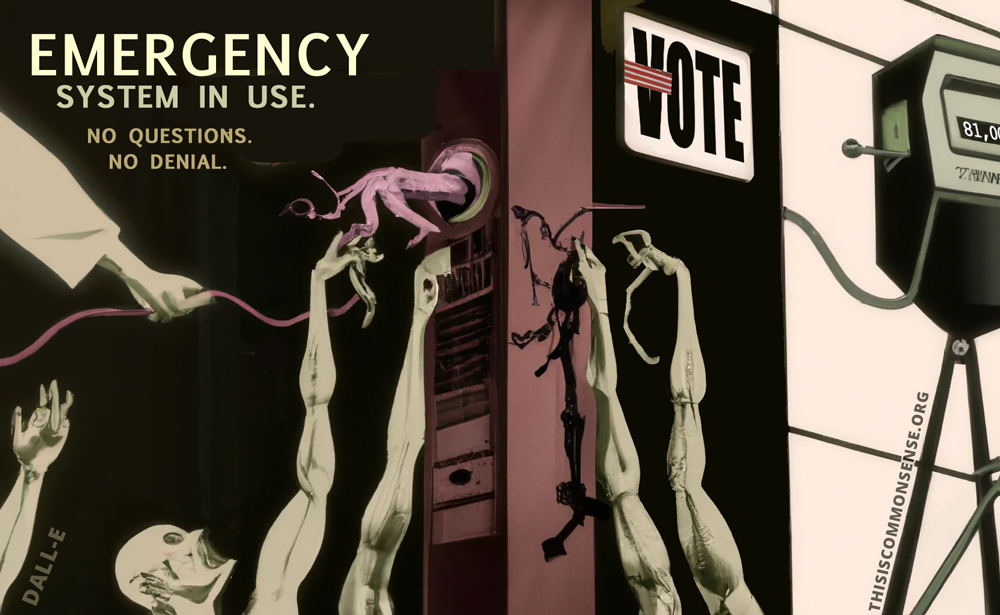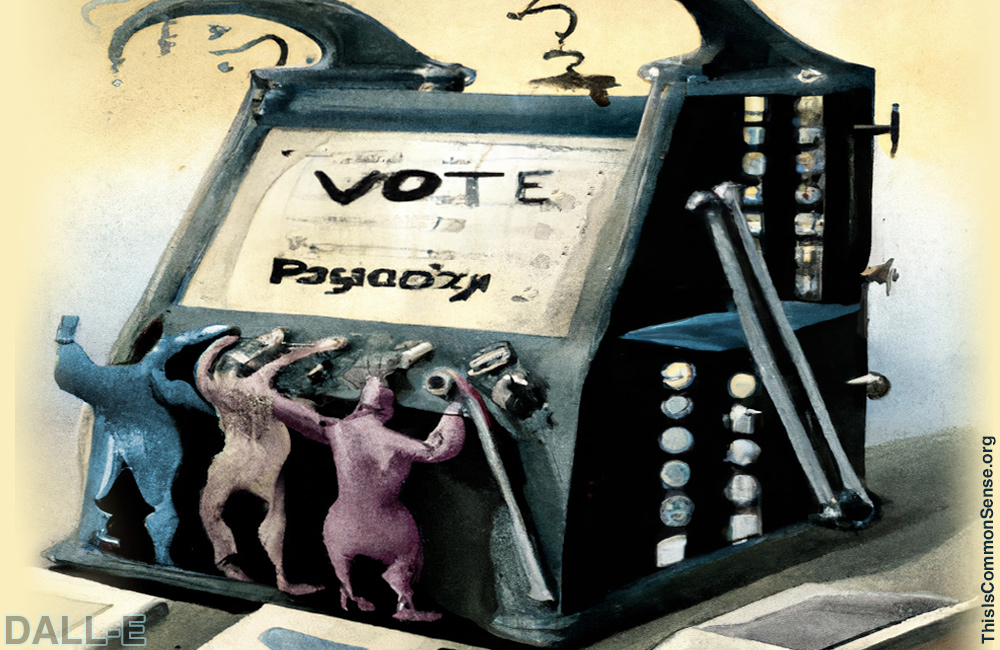Jimmy Lai



“We have the worst inflation in four decades, the worst collapse in real wages in 40 years, the worst crime wave since the 1990s, the worst border crisis in U.S. history, we have Joe Biden who is the least popular president … since presidential polling happened,” Washington Post columnist Marc Thiessen explained on Fox News, “and there wasn’t a red wave.”
Barely a ripple.
Voters, he continued. “looked at all of that and looked at the Republican alternative and said, ‘No, thanks!’”
Calling it “an absolute disaster,” Thiessen advised the GOP to do a “a really deep introspective look in the mirror right now.”
Watch for cracks.
More than the abortion issue or the mixed blessing of Mr. Trump’s omnipresence, I think the GOP’s problem was the lack of any serious, cohesive and positive agenda. We are indeed facing massive inflation, crime, cultural revolution … but what are you going do ’bout it?
Answers aren’t coming from the Republican Party.
In last year’s red wave across my home state of Virginia, it wasn’t now-Governor Glenn Younkin who made respecting the rights of the parents of public education students a cataclysmic issue. Parents did that.
The Republican Revolution of 1994 rode a tsunami produced in no small part by the term limits movement. With term limits measures on the ballot throughout the country, the GOP gained 52 seats to secure a majority after 40 consecutive years in the minority — even defeating the Democratic House Speaker.
Want candidates to ride a popular, pro-freedom wave?
Better start splashing.
This is Common Sense. I’m Paul Jacob.
Illustration created with DALL‑E
—
See all recent commentary
(simplified and organized)

What is it? Election officials may not count mail-in ballots that are undated or incorrectly dated.
Official, yes, but now even more official.
On November 1, a week before the election, the Pennsylvania Supreme Court ruled that yes, election officials must follow Pennsylvania election law that says you can’t count undated or incorrectly dated ballots.
A voter who mails in a ballot is obliged to sign and date the outer envelope before sending it off. The court orders election officials to “refrain from counting any absentee and mail-in ballots received for the November 8, 2022, general election that are contained in undated or incorrectly dated outer envelopes.”
The ruling was issued in response to litigation initiated by the Republican Party, which has launched a slew of lawsuits around the country to combat shady election practices.
The court’s clarification is important. A problem loomed over the upcoming election. Pennsylvania’s secretary of state had been giving the go-ahead for officials to count ballots whether they’re dated properly or not … and to heck with election law and the SCOTUS. Until the ruling, county officials throughout Pennsylvania lacked consistent policies about how to handle bungled ballots.
Of course, when reasonable election rules are ignored, it’s easier to commit election fraud — notwithstanding the disingenuous claim advanced by some proponents of lackadaisical election procedures that fraud is either a vanishingly small problem or does not exist at all.
This is Common Sense. I’m Paul Jacob.
Illustration created with DALL‑E
—
See all recent commentary
(simplified and organized)

The litigation pertains to things like treatment of poll watchers, how absentee ballots should be counted, and whether noncitizens may be allowed to vote. The RNC has achieved some important successes.
A lot of electoral hanky-panky in 2020 was never adequately investigated. Many of us were blindsided by the brazenness with which foes of one-citizen-one-honest-vote exploited COVID-19 fears to undermine election integrity. (It was an emergency. Safeguards just had to be scuttled, supposedly.)
Until the time machine gets invented, though, we’re stuck with the electoral results of that year. We can no longer contest the 2020 election.
But we can darn well contest the 2022 election if and when we espy dubious electoral doings.
And the 2024 election too.
This is Common Sense. I’m Paul Jacob.
Illustration created with DALL‑E
—
See all recent commentary
(simplified and organized)

At least, that’s my opinion.
It’s also the view of the Democrat-controlled General Assembly.
Plus, it’s the preference of the state’s Republican Governor, as well as what the State Election Board wants to do “[a]fter a primary cycle plagued by long delays arising from counting a surge of mail-in ballots.”
Accordingly, you might surmise that when the Maryland Court of Appeals recently agreed with a lower court that the Election Board was A‑OK to count mail-in ballots early, before the election, I would applaud their ruling.
Instead: the Bronx cheer.
This decision undercuts something much more important than ballot-counting speed and efficiency. It destroys the rule of law.
There is a constitutional method for repealing or changing laws on the books, and in fact, as The Washington Post explained,“State lawmakers tried to change the law during this year’s legislative session when they passed a bill that would have permanently removed the provision. But, Gov. Larry Hogan ®, who said he supported counting mail-in ballots early, vetoed the bill, citing other concerns with the legislation.”
Thus, the state’s representative political process spoke, for better or worse. It may be “an outdated law,” as The Post charged, but if it isn’t violating anyone rights, it should not be jettisoned by a judge for the government’s momentary convenience.
Government officials should be required to follow the law, when as here they can, until changed.
Not merely do whatever they want to.
This is Common Sense. I’m Paul Jacob.
Illustration created with DALL‑E
—
See all recent commentary
(simplified and organized)

Last month, the Gallup polling outfit asked Americans about our confidence level in Congress. Did we have “a great deal, quite a lot, some or very little”?
Unlike the 93 percent of us with firing brain synapses, there appeared an enigmatic seven percent, folks who actually confessed to harboring “a great deal” or “quite a lot” of faith in that cabal of corrupt careerists legislating loquaciously in our nation’s Capitol.
It takes all kinds, I guess. The shadowy, slow-witted, and ill-informed must show up in statistics somewhere, right?
Granted, only five percent of Republicans expressed that much cockeyed confidence; it was six percent a year ago. Trusting Democrats hit double-digits, with ten percent believing congressional bull, a fall from the 17 percent hornswoggled in 2021.
Gullible independents came in at the overall average — seven percent — a decrease of five percentage points from last year, when 12 percent clutched a false sense of security regarding our federal legislature.
Among a long list of American institutions, Congress roused the absolute least confidence. Odd that we feel worse about the people we elect to represent us than those we have little if any direct responsibility for or control over.
This must change.
We desperately need term limits. And the competitive elections brought by creating smaller districts where grassroots campaigns employing shoe-leather can compete with the big money and special interest power behind professional politicians.
This is Common Sense. I’m Paul Jacob.
Illustration assist from DALL‑E
—
See all recent commentary
(simplified and organized)